Legal Aspects of Business: Unlimited Partnerships and Companies
VerifiedAdded on 2020/10/22
|11
|3611
|350
Report
AI Summary
This report delves into the legal aspects of business, examining unlimited partnerships and private limited companies. It explores the advantages and disadvantages of each structure, referencing relevant case law and legislation, including the Partnership Act 1890 and the Companies Act 2013. The report also analyzes the role and duties of company directors, focusing on Sections 171, 172, and 173 of the Companies Act 2006, which pertain to acting within powers, promoting company success, and exercising independent judgment. Through case studies and legal analysis, the report provides a comprehensive overview of the legal responsibilities and frameworks that govern business operations and decision-making. The report also addresses the implications of limited liability, the process of forming and terminating partnerships, and the significance of legal compliance for businesses of various sizes.
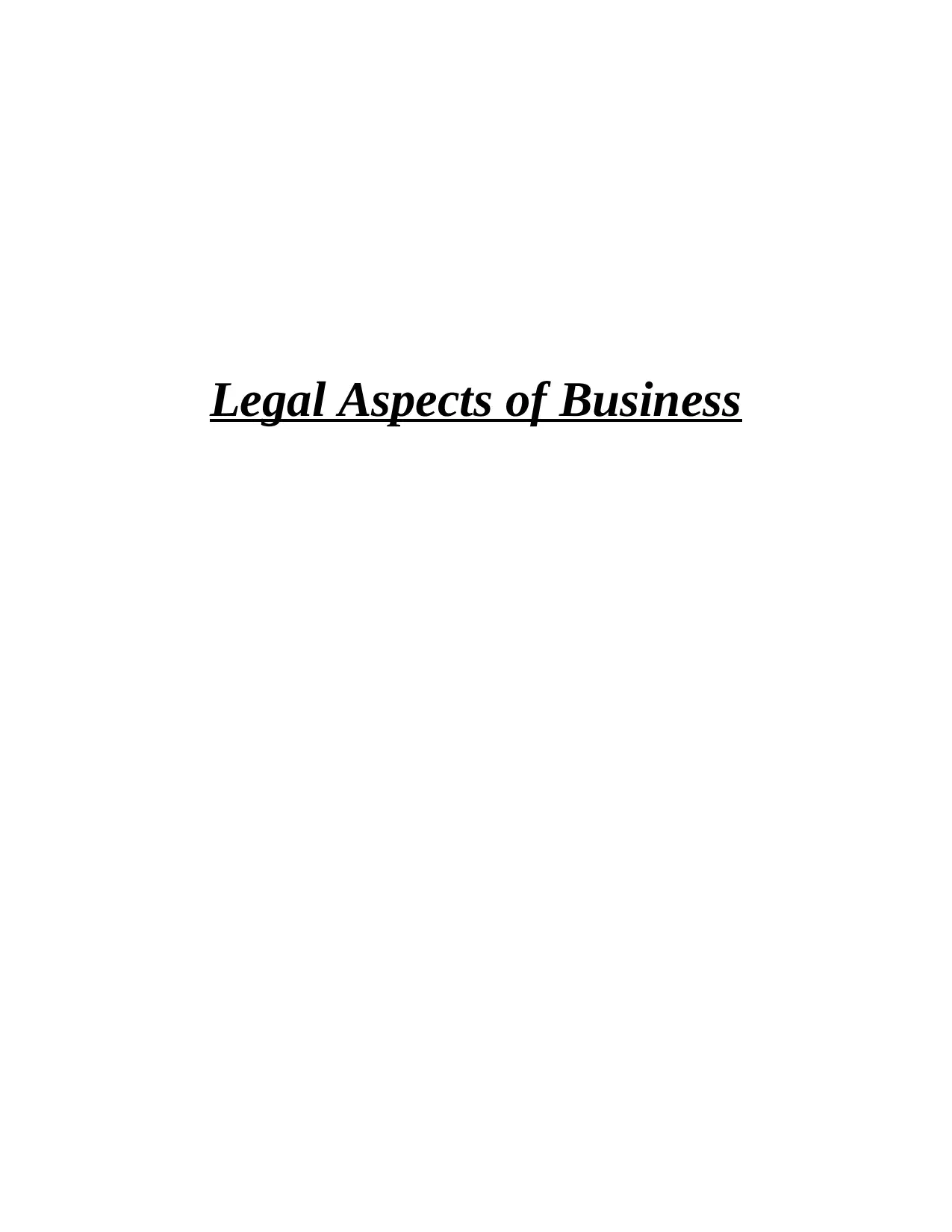
Legal Aspects of Business
Paraphrase This Document
Need a fresh take? Get an instant paraphrase of this document with our AI Paraphraser
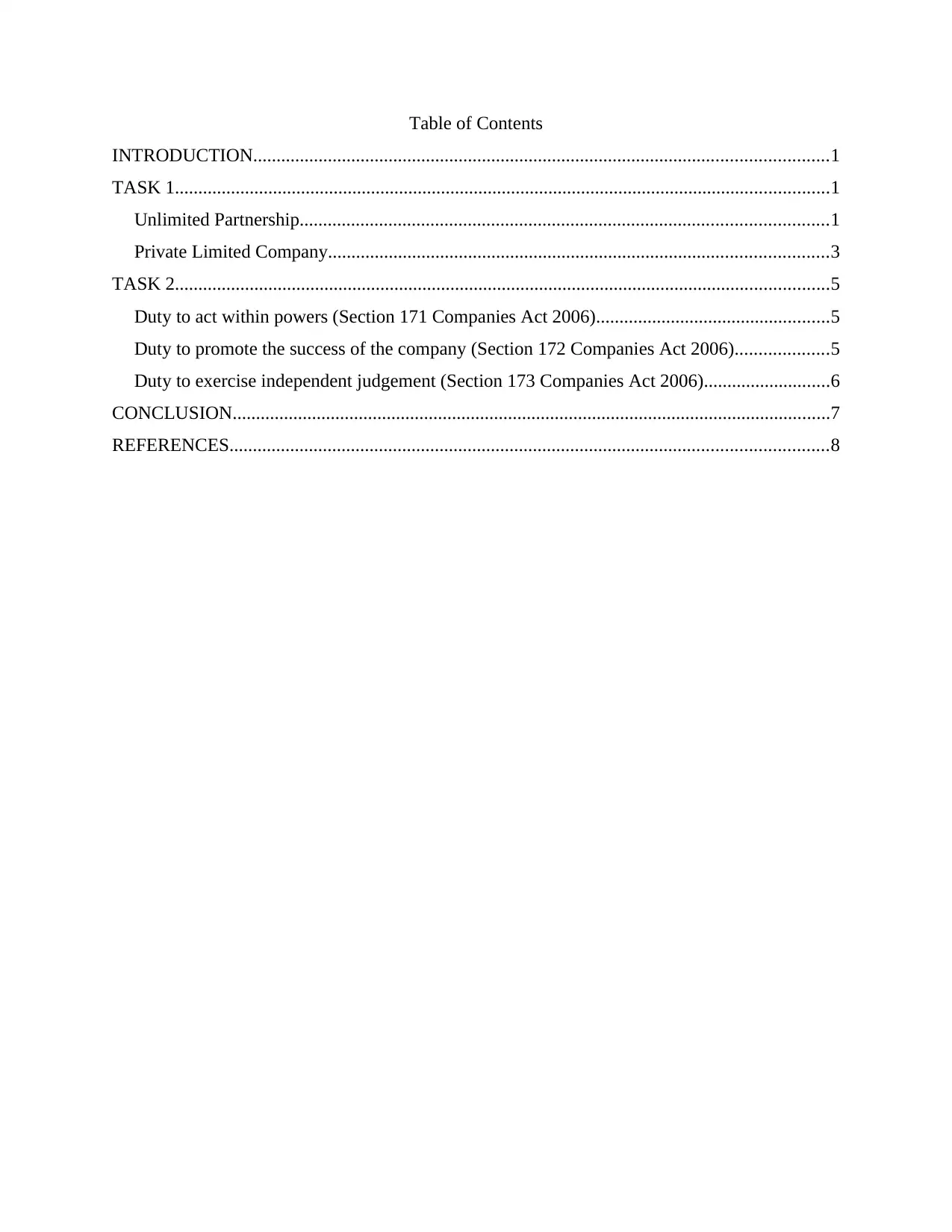
Table of Contents
INTRODUCTION...........................................................................................................................1
TASK 1............................................................................................................................................1
Unlimited Partnership.................................................................................................................1
Private Limited Company...........................................................................................................3
TASK 2............................................................................................................................................5
Duty to act within powers (Section 171 Companies Act 2006)..................................................5
Duty to promote the success of the company (Section 172 Companies Act 2006)....................5
Duty to exercise independent judgement (Section 173 Companies Act 2006)...........................6
CONCLUSION................................................................................................................................7
REFERENCES................................................................................................................................8
INTRODUCTION...........................................................................................................................1
TASK 1............................................................................................................................................1
Unlimited Partnership.................................................................................................................1
Private Limited Company...........................................................................................................3
TASK 2............................................................................................................................................5
Duty to act within powers (Section 171 Companies Act 2006)..................................................5
Duty to promote the success of the company (Section 172 Companies Act 2006)....................5
Duty to exercise independent judgement (Section 173 Companies Act 2006)...........................6
CONCLUSION................................................................................................................................7
REFERENCES................................................................................................................................8
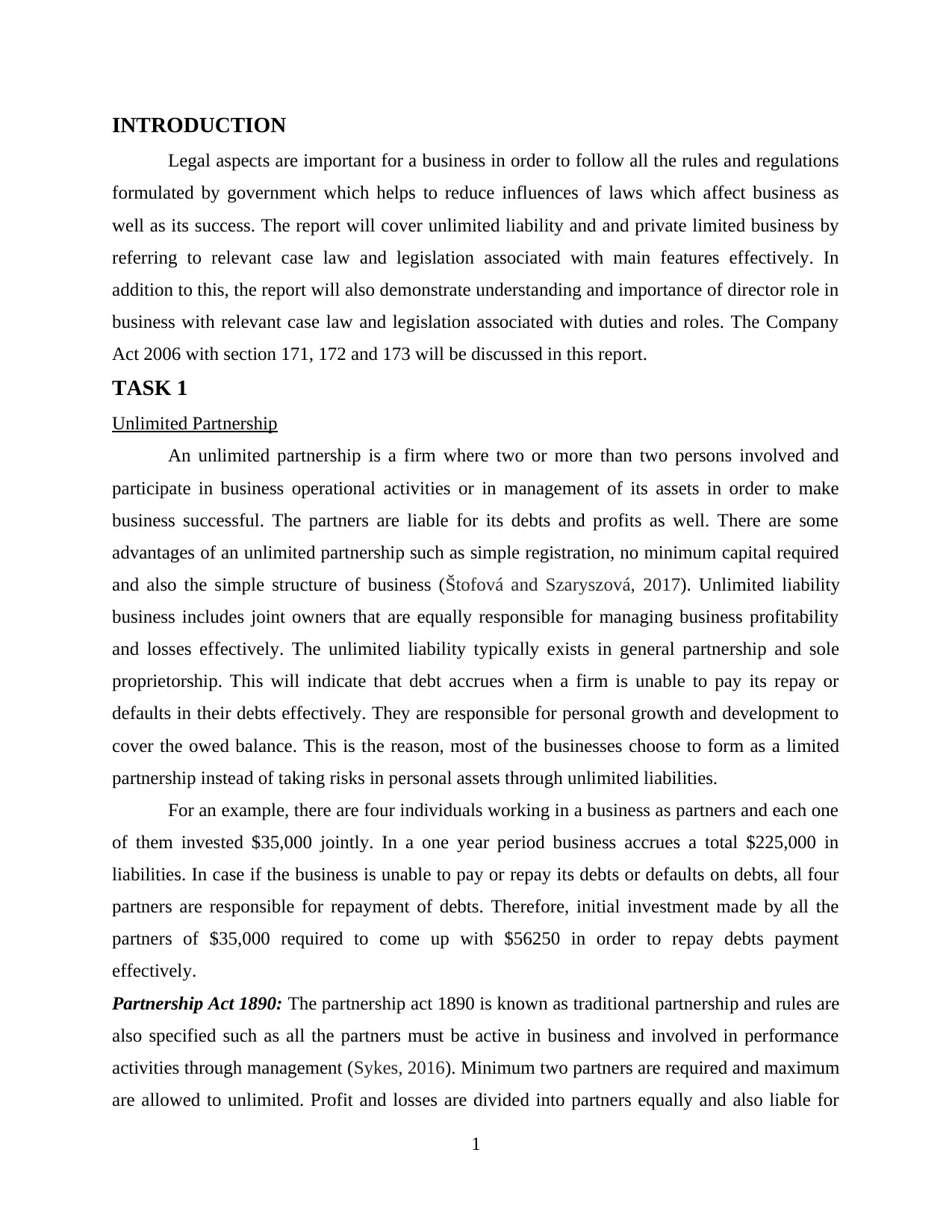
INTRODUCTION
Legal aspects are important for a business in order to follow all the rules and regulations
formulated by government which helps to reduce influences of laws which affect business as
well as its success. The report will cover unlimited liability and and private limited business by
referring to relevant case law and legislation associated with main features effectively. In
addition to this, the report will also demonstrate understanding and importance of director role in
business with relevant case law and legislation associated with duties and roles. The Company
Act 2006 with section 171, 172 and 173 will be discussed in this report.
TASK 1
Unlimited Partnership
An unlimited partnership is a firm where two or more than two persons involved and
participate in business operational activities or in management of its assets in order to make
business successful. The partners are liable for its debts and profits as well. There are some
advantages of an unlimited partnership such as simple registration, no minimum capital required
and also the simple structure of business (Štofová and Szaryszová, 2017). Unlimited liability
business includes joint owners that are equally responsible for managing business profitability
and losses effectively. The unlimited liability typically exists in general partnership and sole
proprietorship. This will indicate that debt accrues when a firm is unable to pay its repay or
defaults in their debts effectively. They are responsible for personal growth and development to
cover the owed balance. This is the reason, most of the businesses choose to form as a limited
partnership instead of taking risks in personal assets through unlimited liabilities.
For an example, there are four individuals working in a business as partners and each one
of them invested $35,000 jointly. In a one year period business accrues a total $225,000 in
liabilities. In case if the business is unable to pay or repay its debts or defaults on debts, all four
partners are responsible for repayment of debts. Therefore, initial investment made by all the
partners of $35,000 required to come up with $56250 in order to repay debts payment
effectively.
Partnership Act 1890: The partnership act 1890 is known as traditional partnership and rules are
also specified such as all the partners must be active in business and involved in performance
activities through management (Sykes, 2016). Minimum two partners are required and maximum
are allowed to unlimited. Profit and losses are divided into partners equally and also liable for
1
Legal aspects are important for a business in order to follow all the rules and regulations
formulated by government which helps to reduce influences of laws which affect business as
well as its success. The report will cover unlimited liability and and private limited business by
referring to relevant case law and legislation associated with main features effectively. In
addition to this, the report will also demonstrate understanding and importance of director role in
business with relevant case law and legislation associated with duties and roles. The Company
Act 2006 with section 171, 172 and 173 will be discussed in this report.
TASK 1
Unlimited Partnership
An unlimited partnership is a firm where two or more than two persons involved and
participate in business operational activities or in management of its assets in order to make
business successful. The partners are liable for its debts and profits as well. There are some
advantages of an unlimited partnership such as simple registration, no minimum capital required
and also the simple structure of business (Štofová and Szaryszová, 2017). Unlimited liability
business includes joint owners that are equally responsible for managing business profitability
and losses effectively. The unlimited liability typically exists in general partnership and sole
proprietorship. This will indicate that debt accrues when a firm is unable to pay its repay or
defaults in their debts effectively. They are responsible for personal growth and development to
cover the owed balance. This is the reason, most of the businesses choose to form as a limited
partnership instead of taking risks in personal assets through unlimited liabilities.
For an example, there are four individuals working in a business as partners and each one
of them invested $35,000 jointly. In a one year period business accrues a total $225,000 in
liabilities. In case if the business is unable to pay or repay its debts or defaults on debts, all four
partners are responsible for repayment of debts. Therefore, initial investment made by all the
partners of $35,000 required to come up with $56250 in order to repay debts payment
effectively.
Partnership Act 1890: The partnership act 1890 is known as traditional partnership and rules are
also specified such as all the partners must be active in business and involved in performance
activities through management (Sykes, 2016). Minimum two partners are required and maximum
are allowed to unlimited. Profit and losses are divided into partners equally and also liable for
1
⊘ This is a preview!⊘
Do you want full access?
Subscribe today to unlock all pages.

Trusted by 1+ million students worldwide
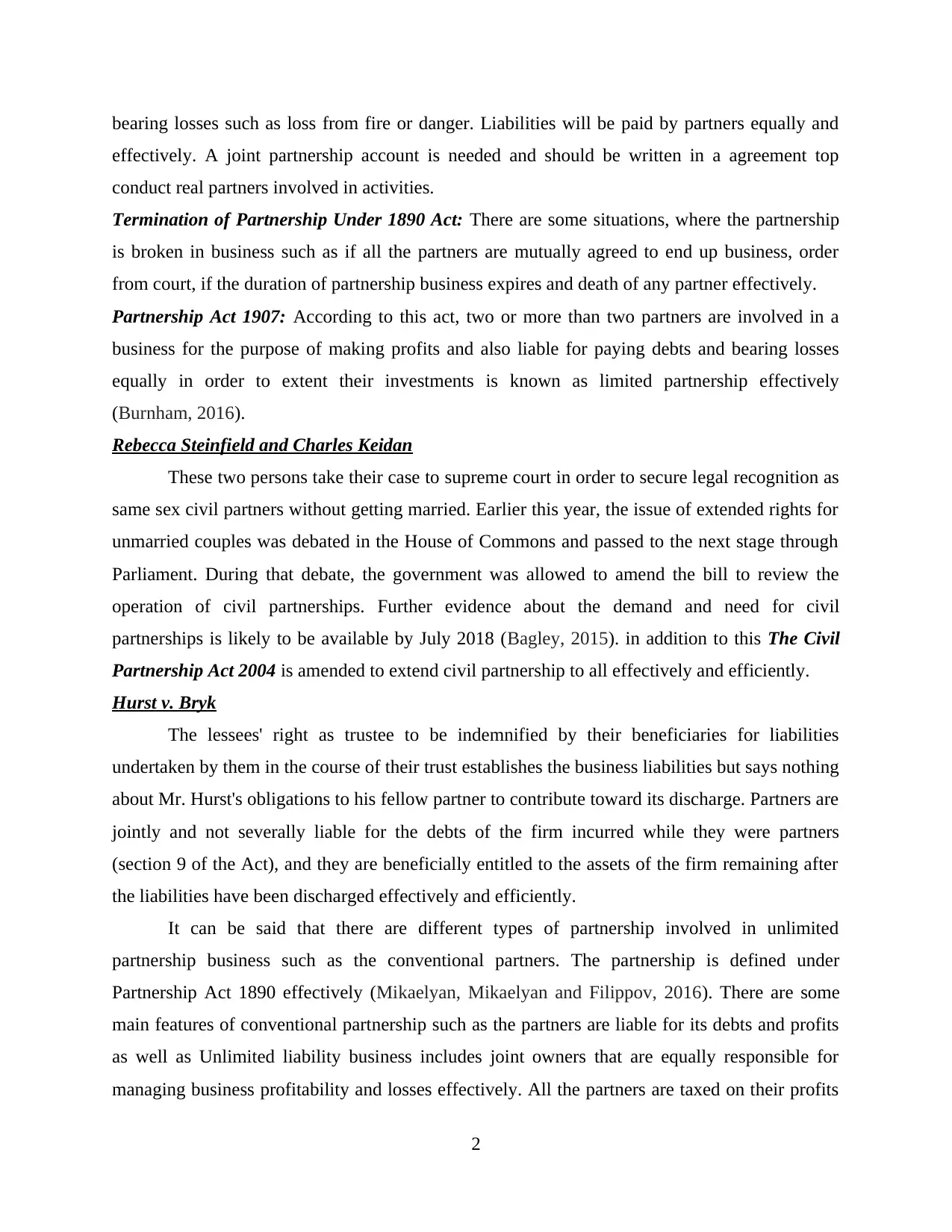
bearing losses such as loss from fire or danger. Liabilities will be paid by partners equally and
effectively. A joint partnership account is needed and should be written in a agreement top
conduct real partners involved in activities.
Termination of Partnership Under 1890 Act: There are some situations, where the partnership
is broken in business such as if all the partners are mutually agreed to end up business, order
from court, if the duration of partnership business expires and death of any partner effectively.
Partnership Act 1907: According to this act, two or more than two partners are involved in a
business for the purpose of making profits and also liable for paying debts and bearing losses
equally in order to extent their investments is known as limited partnership effectively
(Burnham, 2016).
Rebecca Steinfield and Charles Keidan
These two persons take their case to supreme court in order to secure legal recognition as
same sex civil partners without getting married. Earlier this year, the issue of extended rights for
unmarried couples was debated in the House of Commons and passed to the next stage through
Parliament. During that debate, the government was allowed to amend the bill to review the
operation of civil partnerships. Further evidence about the demand and need for civil
partnerships is likely to be available by July 2018 (Bagley, 2015). in addition to this The Civil
Partnership Act 2004 is amended to extend civil partnership to all effectively and efficiently.
Hurst v. Bryk
The lessees' right as trustee to be indemnified by their beneficiaries for liabilities
undertaken by them in the course of their trust establishes the business liabilities but says nothing
about Mr. Hurst's obligations to his fellow partner to contribute toward its discharge. Partners are
jointly and not severally liable for the debts of the firm incurred while they were partners
(section 9 of the Act), and they are beneficially entitled to the assets of the firm remaining after
the liabilities have been discharged effectively and efficiently.
It can be said that there are different types of partnership involved in unlimited
partnership business such as the conventional partners. The partnership is defined under
Partnership Act 1890 effectively (Mikaelyan, Mikaelyan and Filippov, 2016). There are some
main features of conventional partnership such as the partners are liable for its debts and profits
as well as Unlimited liability business includes joint owners that are equally responsible for
managing business profitability and losses effectively. All the partners are taxed on their profits
2
effectively. A joint partnership account is needed and should be written in a agreement top
conduct real partners involved in activities.
Termination of Partnership Under 1890 Act: There are some situations, where the partnership
is broken in business such as if all the partners are mutually agreed to end up business, order
from court, if the duration of partnership business expires and death of any partner effectively.
Partnership Act 1907: According to this act, two or more than two partners are involved in a
business for the purpose of making profits and also liable for paying debts and bearing losses
equally in order to extent their investments is known as limited partnership effectively
(Burnham, 2016).
Rebecca Steinfield and Charles Keidan
These two persons take their case to supreme court in order to secure legal recognition as
same sex civil partners without getting married. Earlier this year, the issue of extended rights for
unmarried couples was debated in the House of Commons and passed to the next stage through
Parliament. During that debate, the government was allowed to amend the bill to review the
operation of civil partnerships. Further evidence about the demand and need for civil
partnerships is likely to be available by July 2018 (Bagley, 2015). in addition to this The Civil
Partnership Act 2004 is amended to extend civil partnership to all effectively and efficiently.
Hurst v. Bryk
The lessees' right as trustee to be indemnified by their beneficiaries for liabilities
undertaken by them in the course of their trust establishes the business liabilities but says nothing
about Mr. Hurst's obligations to his fellow partner to contribute toward its discharge. Partners are
jointly and not severally liable for the debts of the firm incurred while they were partners
(section 9 of the Act), and they are beneficially entitled to the assets of the firm remaining after
the liabilities have been discharged effectively and efficiently.
It can be said that there are different types of partnership involved in unlimited
partnership business such as the conventional partners. The partnership is defined under
Partnership Act 1890 effectively (Mikaelyan, Mikaelyan and Filippov, 2016). There are some
main features of conventional partnership such as the partners are liable for its debts and profits
as well as Unlimited liability business includes joint owners that are equally responsible for
managing business profitability and losses effectively. All the partners are taxed on their profits
2
Paraphrase This Document
Need a fresh take? Get an instant paraphrase of this document with our AI Paraphraser
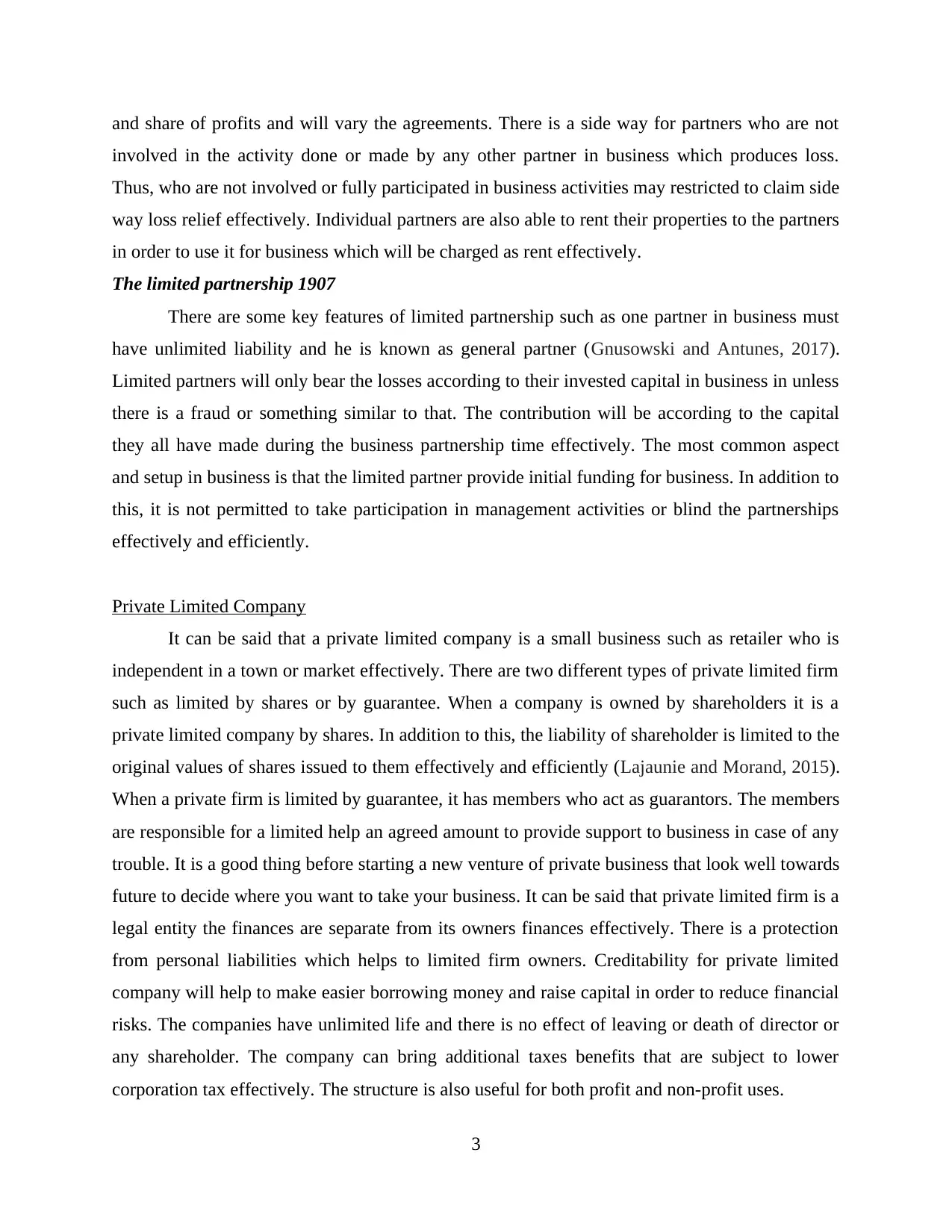
and share of profits and will vary the agreements. There is a side way for partners who are not
involved in the activity done or made by any other partner in business which produces loss.
Thus, who are not involved or fully participated in business activities may restricted to claim side
way loss relief effectively. Individual partners are also able to rent their properties to the partners
in order to use it for business which will be charged as rent effectively.
The limited partnership 1907
There are some key features of limited partnership such as one partner in business must
have unlimited liability and he is known as general partner (Gnusowski and Antunes, 2017).
Limited partners will only bear the losses according to their invested capital in business in unless
there is a fraud or something similar to that. The contribution will be according to the capital
they all have made during the business partnership time effectively. The most common aspect
and setup in business is that the limited partner provide initial funding for business. In addition to
this, it is not permitted to take participation in management activities or blind the partnerships
effectively and efficiently.
Private Limited Company
It can be said that a private limited company is a small business such as retailer who is
independent in a town or market effectively. There are two different types of private limited firm
such as limited by shares or by guarantee. When a company is owned by shareholders it is a
private limited company by shares. In addition to this, the liability of shareholder is limited to the
original values of shares issued to them effectively and efficiently (Lajaunie and Morand, 2015).
When a private firm is limited by guarantee, it has members who act as guarantors. The members
are responsible for a limited help an agreed amount to provide support to business in case of any
trouble. It is a good thing before starting a new venture of private business that look well towards
future to decide where you want to take your business. It can be said that private limited firm is a
legal entity the finances are separate from its owners finances effectively. There is a protection
from personal liabilities which helps to limited firm owners. Creditability for private limited
company will help to make easier borrowing money and raise capital in order to reduce financial
risks. The companies have unlimited life and there is no effect of leaving or death of director or
any shareholder. The company can bring additional taxes benefits that are subject to lower
corporation tax effectively. The structure is also useful for both profit and non-profit uses.
3
involved in the activity done or made by any other partner in business which produces loss.
Thus, who are not involved or fully participated in business activities may restricted to claim side
way loss relief effectively. Individual partners are also able to rent their properties to the partners
in order to use it for business which will be charged as rent effectively.
The limited partnership 1907
There are some key features of limited partnership such as one partner in business must
have unlimited liability and he is known as general partner (Gnusowski and Antunes, 2017).
Limited partners will only bear the losses according to their invested capital in business in unless
there is a fraud or something similar to that. The contribution will be according to the capital
they all have made during the business partnership time effectively. The most common aspect
and setup in business is that the limited partner provide initial funding for business. In addition to
this, it is not permitted to take participation in management activities or blind the partnerships
effectively and efficiently.
Private Limited Company
It can be said that a private limited company is a small business such as retailer who is
independent in a town or market effectively. There are two different types of private limited firm
such as limited by shares or by guarantee. When a company is owned by shareholders it is a
private limited company by shares. In addition to this, the liability of shareholder is limited to the
original values of shares issued to them effectively and efficiently (Lajaunie and Morand, 2015).
When a private firm is limited by guarantee, it has members who act as guarantors. The members
are responsible for a limited help an agreed amount to provide support to business in case of any
trouble. It is a good thing before starting a new venture of private business that look well towards
future to decide where you want to take your business. It can be said that private limited firm is a
legal entity the finances are separate from its owners finances effectively. There is a protection
from personal liabilities which helps to limited firm owners. Creditability for private limited
company will help to make easier borrowing money and raise capital in order to reduce financial
risks. The companies have unlimited life and there is no effect of leaving or death of director or
any shareholder. The company can bring additional taxes benefits that are subject to lower
corporation tax effectively. The structure is also useful for both profit and non-profit uses.
3
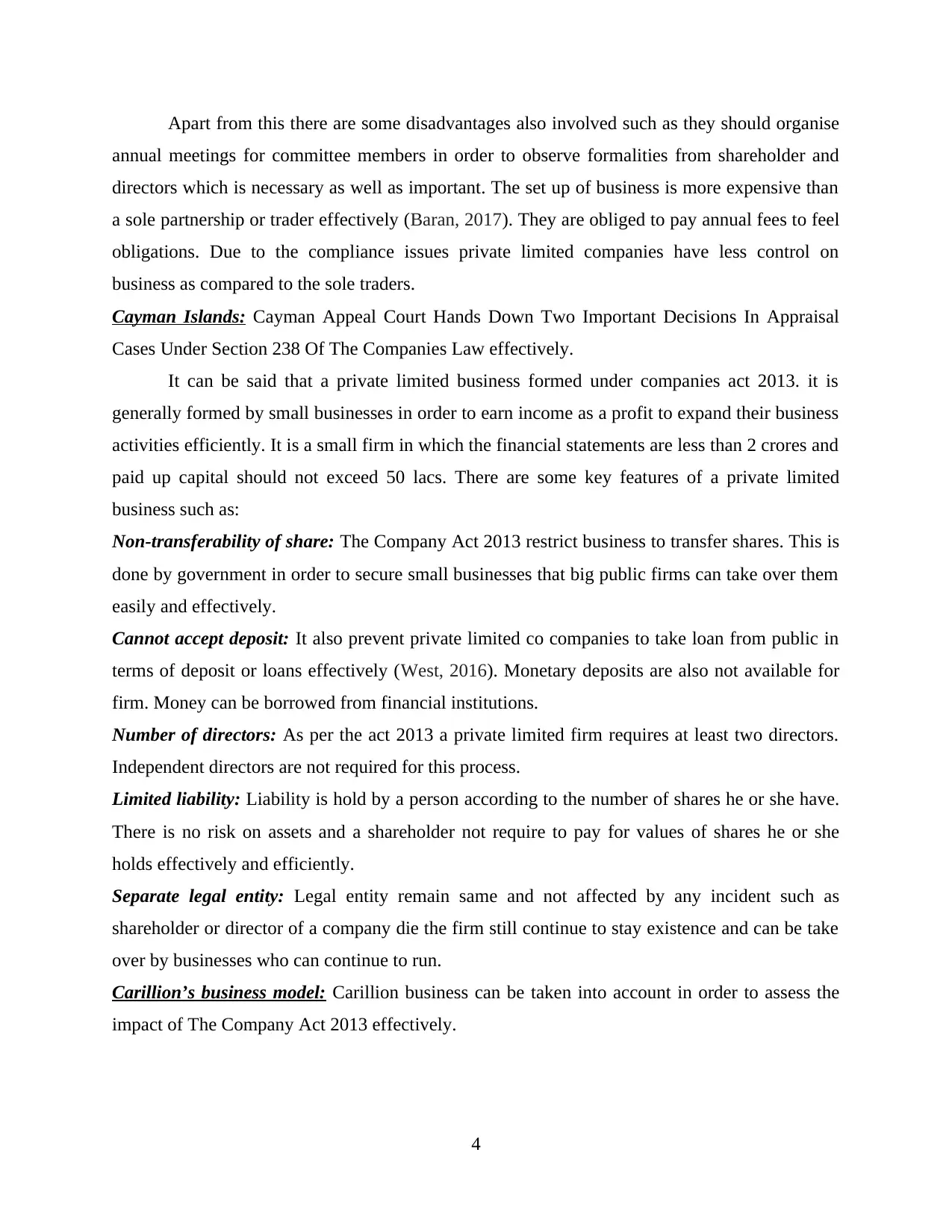
Apart from this there are some disadvantages also involved such as they should organise
annual meetings for committee members in order to observe formalities from shareholder and
directors which is necessary as well as important. The set up of business is more expensive than
a sole partnership or trader effectively (Baran, 2017). They are obliged to pay annual fees to feel
obligations. Due to the compliance issues private limited companies have less control on
business as compared to the sole traders.
Cayman Islands: Cayman Appeal Court Hands Down Two Important Decisions In Appraisal
Cases Under Section 238 Of The Companies Law effectively.
It can be said that a private limited business formed under companies act 2013. it is
generally formed by small businesses in order to earn income as a profit to expand their business
activities efficiently. It is a small firm in which the financial statements are less than 2 crores and
paid up capital should not exceed 50 lacs. There are some key features of a private limited
business such as:
Non-transferability of share: The Company Act 2013 restrict business to transfer shares. This is
done by government in order to secure small businesses that big public firms can take over them
easily and effectively.
Cannot accept deposit: It also prevent private limited co companies to take loan from public in
terms of deposit or loans effectively (West, 2016). Monetary deposits are also not available for
firm. Money can be borrowed from financial institutions.
Number of directors: As per the act 2013 a private limited firm requires at least two directors.
Independent directors are not required for this process.
Limited liability: Liability is hold by a person according to the number of shares he or she have.
There is no risk on assets and a shareholder not require to pay for values of shares he or she
holds effectively and efficiently.
Separate legal entity: Legal entity remain same and not affected by any incident such as
shareholder or director of a company die the firm still continue to stay existence and can be take
over by businesses who can continue to run.
Carillion’s business model: Carillion business can be taken into account in order to assess the
impact of The Company Act 2013 effectively.
4
annual meetings for committee members in order to observe formalities from shareholder and
directors which is necessary as well as important. The set up of business is more expensive than
a sole partnership or trader effectively (Baran, 2017). They are obliged to pay annual fees to feel
obligations. Due to the compliance issues private limited companies have less control on
business as compared to the sole traders.
Cayman Islands: Cayman Appeal Court Hands Down Two Important Decisions In Appraisal
Cases Under Section 238 Of The Companies Law effectively.
It can be said that a private limited business formed under companies act 2013. it is
generally formed by small businesses in order to earn income as a profit to expand their business
activities efficiently. It is a small firm in which the financial statements are less than 2 crores and
paid up capital should not exceed 50 lacs. There are some key features of a private limited
business such as:
Non-transferability of share: The Company Act 2013 restrict business to transfer shares. This is
done by government in order to secure small businesses that big public firms can take over them
easily and effectively.
Cannot accept deposit: It also prevent private limited co companies to take loan from public in
terms of deposit or loans effectively (West, 2016). Monetary deposits are also not available for
firm. Money can be borrowed from financial institutions.
Number of directors: As per the act 2013 a private limited firm requires at least two directors.
Independent directors are not required for this process.
Limited liability: Liability is hold by a person according to the number of shares he or she have.
There is no risk on assets and a shareholder not require to pay for values of shares he or she
holds effectively and efficiently.
Separate legal entity: Legal entity remain same and not affected by any incident such as
shareholder or director of a company die the firm still continue to stay existence and can be take
over by businesses who can continue to run.
Carillion’s business model: Carillion business can be taken into account in order to assess the
impact of The Company Act 2013 effectively.
4
⊘ This is a preview!⊘
Do you want full access?
Subscribe today to unlock all pages.

Trusted by 1+ million students worldwide
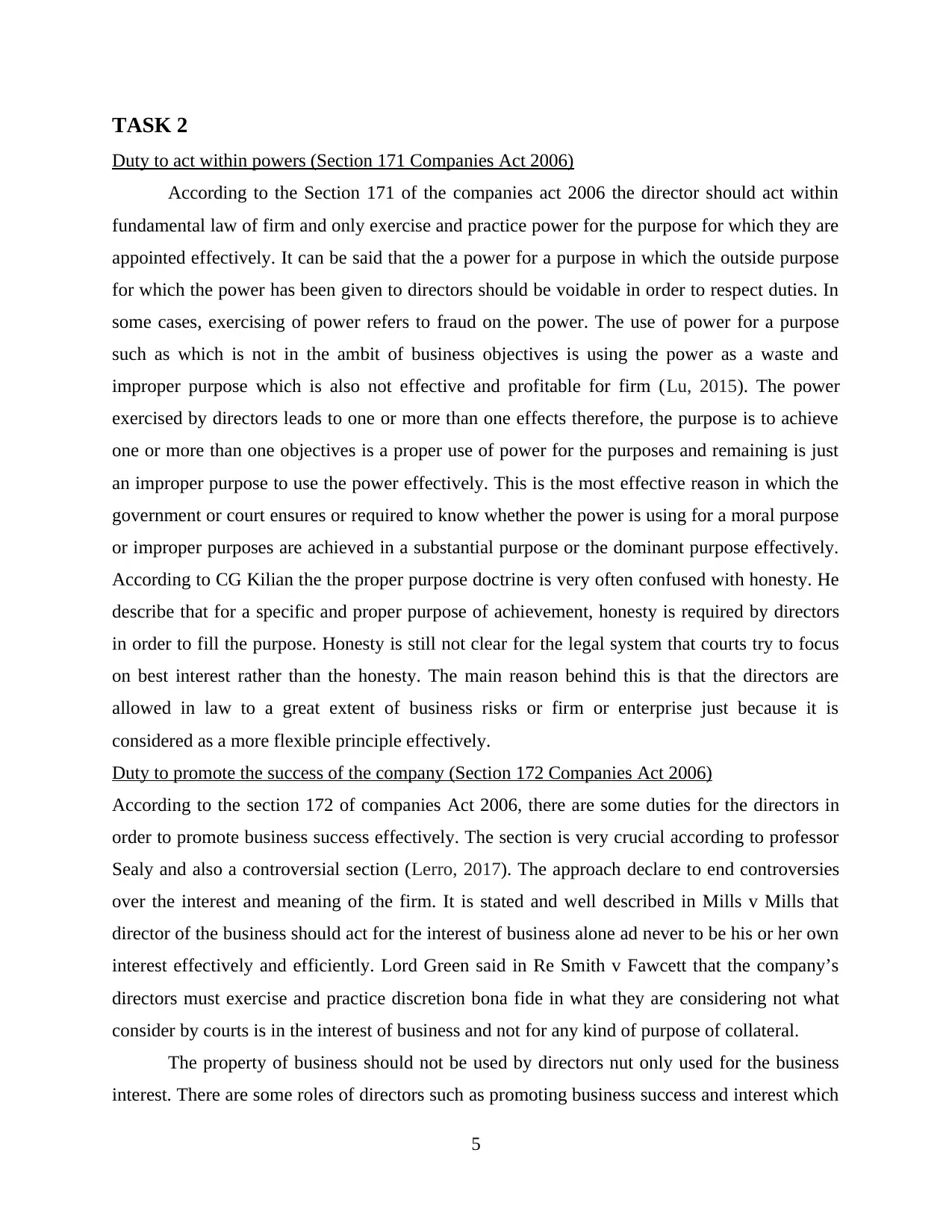
TASK 2
Duty to act within powers (Section 171 Companies Act 2006)
According to the Section 171 of the companies act 2006 the director should act within
fundamental law of firm and only exercise and practice power for the purpose for which they are
appointed effectively. It can be said that the a power for a purpose in which the outside purpose
for which the power has been given to directors should be voidable in order to respect duties. In
some cases, exercising of power refers to fraud on the power. The use of power for a purpose
such as which is not in the ambit of business objectives is using the power as a waste and
improper purpose which is also not effective and profitable for firm (Lu, 2015). The power
exercised by directors leads to one or more than one effects therefore, the purpose is to achieve
one or more than one objectives is a proper use of power for the purposes and remaining is just
an improper purpose to use the power effectively. This is the most effective reason in which the
government or court ensures or required to know whether the power is using for a moral purpose
or improper purposes are achieved in a substantial purpose or the dominant purpose effectively.
According to CG Kilian the the proper purpose doctrine is very often confused with honesty. He
describe that for a specific and proper purpose of achievement, honesty is required by directors
in order to fill the purpose. Honesty is still not clear for the legal system that courts try to focus
on best interest rather than the honesty. The main reason behind this is that the directors are
allowed in law to a great extent of business risks or firm or enterprise just because it is
considered as a more flexible principle effectively.
Duty to promote the success of the company (Section 172 Companies Act 2006)
According to the section 172 of companies Act 2006, there are some duties for the directors in
order to promote business success effectively. The section is very crucial according to professor
Sealy and also a controversial section (Lerro, 2017). The approach declare to end controversies
over the interest and meaning of the firm. It is stated and well described in Mills v Mills that
director of the business should act for the interest of business alone ad never to be his or her own
interest effectively and efficiently. Lord Green said in Re Smith v Fawcett that the company’s
directors must exercise and practice discretion bona fide in what they are considering not what
consider by courts is in the interest of business and not for any kind of purpose of collateral.
The property of business should not be used by directors nut only used for the business
interest. There are some roles of directors such as promoting business success and interest which
5
Duty to act within powers (Section 171 Companies Act 2006)
According to the Section 171 of the companies act 2006 the director should act within
fundamental law of firm and only exercise and practice power for the purpose for which they are
appointed effectively. It can be said that the a power for a purpose in which the outside purpose
for which the power has been given to directors should be voidable in order to respect duties. In
some cases, exercising of power refers to fraud on the power. The use of power for a purpose
such as which is not in the ambit of business objectives is using the power as a waste and
improper purpose which is also not effective and profitable for firm (Lu, 2015). The power
exercised by directors leads to one or more than one effects therefore, the purpose is to achieve
one or more than one objectives is a proper use of power for the purposes and remaining is just
an improper purpose to use the power effectively. This is the most effective reason in which the
government or court ensures or required to know whether the power is using for a moral purpose
or improper purposes are achieved in a substantial purpose or the dominant purpose effectively.
According to CG Kilian the the proper purpose doctrine is very often confused with honesty. He
describe that for a specific and proper purpose of achievement, honesty is required by directors
in order to fill the purpose. Honesty is still not clear for the legal system that courts try to focus
on best interest rather than the honesty. The main reason behind this is that the directors are
allowed in law to a great extent of business risks or firm or enterprise just because it is
considered as a more flexible principle effectively.
Duty to promote the success of the company (Section 172 Companies Act 2006)
According to the section 172 of companies Act 2006, there are some duties for the directors in
order to promote business success effectively. The section is very crucial according to professor
Sealy and also a controversial section (Lerro, 2017). The approach declare to end controversies
over the interest and meaning of the firm. It is stated and well described in Mills v Mills that
director of the business should act for the interest of business alone ad never to be his or her own
interest effectively and efficiently. Lord Green said in Re Smith v Fawcett that the company’s
directors must exercise and practice discretion bona fide in what they are considering not what
consider by courts is in the interest of business and not for any kind of purpose of collateral.
The property of business should not be used by directors nut only used for the business
interest. There are some roles of directors such as promoting business success and interest which
5
Paraphrase This Document
Need a fresh take? Get an instant paraphrase of this document with our AI Paraphraser
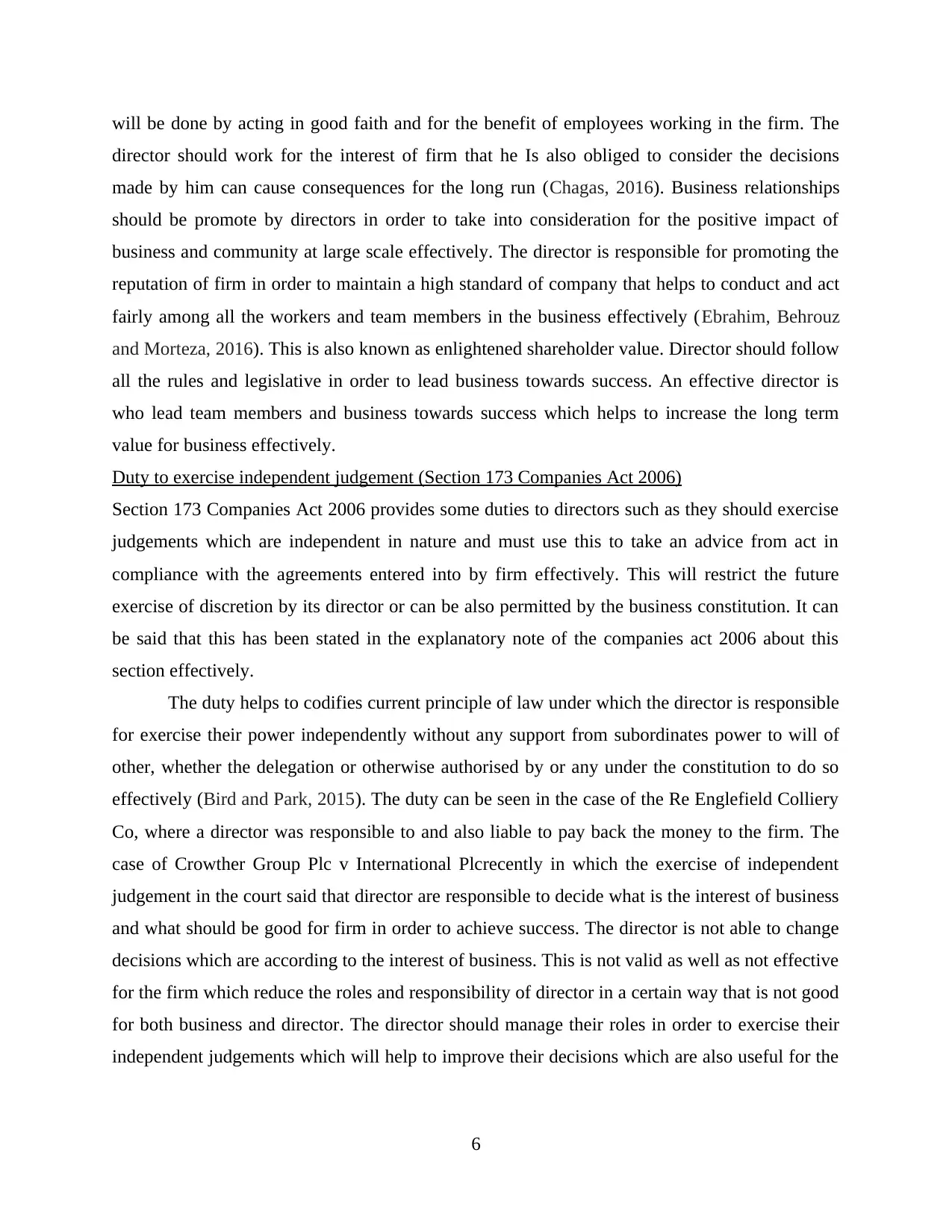
will be done by acting in good faith and for the benefit of employees working in the firm. The
director should work for the interest of firm that he Is also obliged to consider the decisions
made by him can cause consequences for the long run (Chagas, 2016). Business relationships
should be promote by directors in order to take into consideration for the positive impact of
business and community at large scale effectively. The director is responsible for promoting the
reputation of firm in order to maintain a high standard of company that helps to conduct and act
fairly among all the workers and team members in the business effectively (Ebrahim, Behrouz
and Morteza, 2016). This is also known as enlightened shareholder value. Director should follow
all the rules and legislative in order to lead business towards success. An effective director is
who lead team members and business towards success which helps to increase the long term
value for business effectively.
Duty to exercise independent judgement (Section 173 Companies Act 2006)
Section 173 Companies Act 2006 provides some duties to directors such as they should exercise
judgements which are independent in nature and must use this to take an advice from act in
compliance with the agreements entered into by firm effectively. This will restrict the future
exercise of discretion by its director or can be also permitted by the business constitution. It can
be said that this has been stated in the explanatory note of the companies act 2006 about this
section effectively.
The duty helps to codifies current principle of law under which the director is responsible
for exercise their power independently without any support from subordinates power to will of
other, whether the delegation or otherwise authorised by or any under the constitution to do so
effectively (Bird and Park, 2015). The duty can be seen in the case of the Re Englefield Colliery
Co, where a director was responsible to and also liable to pay back the money to the firm. The
case of Crowther Group Plc v International Plcrecently in which the exercise of independent
judgement in the court said that director are responsible to decide what is the interest of business
and what should be good for firm in order to achieve success. The director is not able to change
decisions which are according to the interest of business. This is not valid as well as not effective
for the firm which reduce the roles and responsibility of director in a certain way that is not good
for both business and director. The director should manage their roles in order to exercise their
independent judgements which will help to improve their decisions which are also useful for the
6
director should work for the interest of firm that he Is also obliged to consider the decisions
made by him can cause consequences for the long run (Chagas, 2016). Business relationships
should be promote by directors in order to take into consideration for the positive impact of
business and community at large scale effectively. The director is responsible for promoting the
reputation of firm in order to maintain a high standard of company that helps to conduct and act
fairly among all the workers and team members in the business effectively (Ebrahim, Behrouz
and Morteza, 2016). This is also known as enlightened shareholder value. Director should follow
all the rules and legislative in order to lead business towards success. An effective director is
who lead team members and business towards success which helps to increase the long term
value for business effectively.
Duty to exercise independent judgement (Section 173 Companies Act 2006)
Section 173 Companies Act 2006 provides some duties to directors such as they should exercise
judgements which are independent in nature and must use this to take an advice from act in
compliance with the agreements entered into by firm effectively. This will restrict the future
exercise of discretion by its director or can be also permitted by the business constitution. It can
be said that this has been stated in the explanatory note of the companies act 2006 about this
section effectively.
The duty helps to codifies current principle of law under which the director is responsible
for exercise their power independently without any support from subordinates power to will of
other, whether the delegation or otherwise authorised by or any under the constitution to do so
effectively (Bird and Park, 2015). The duty can be seen in the case of the Re Englefield Colliery
Co, where a director was responsible to and also liable to pay back the money to the firm. The
case of Crowther Group Plc v International Plcrecently in which the exercise of independent
judgement in the court said that director are responsible to decide what is the interest of business
and what should be good for firm in order to achieve success. The director is not able to change
decisions which are according to the interest of business. This is not valid as well as not effective
for the firm which reduce the roles and responsibility of director in a certain way that is not good
for both business and director. The director should manage their roles in order to exercise their
independent judgements which will help to improve their decisions which are also useful for the
6
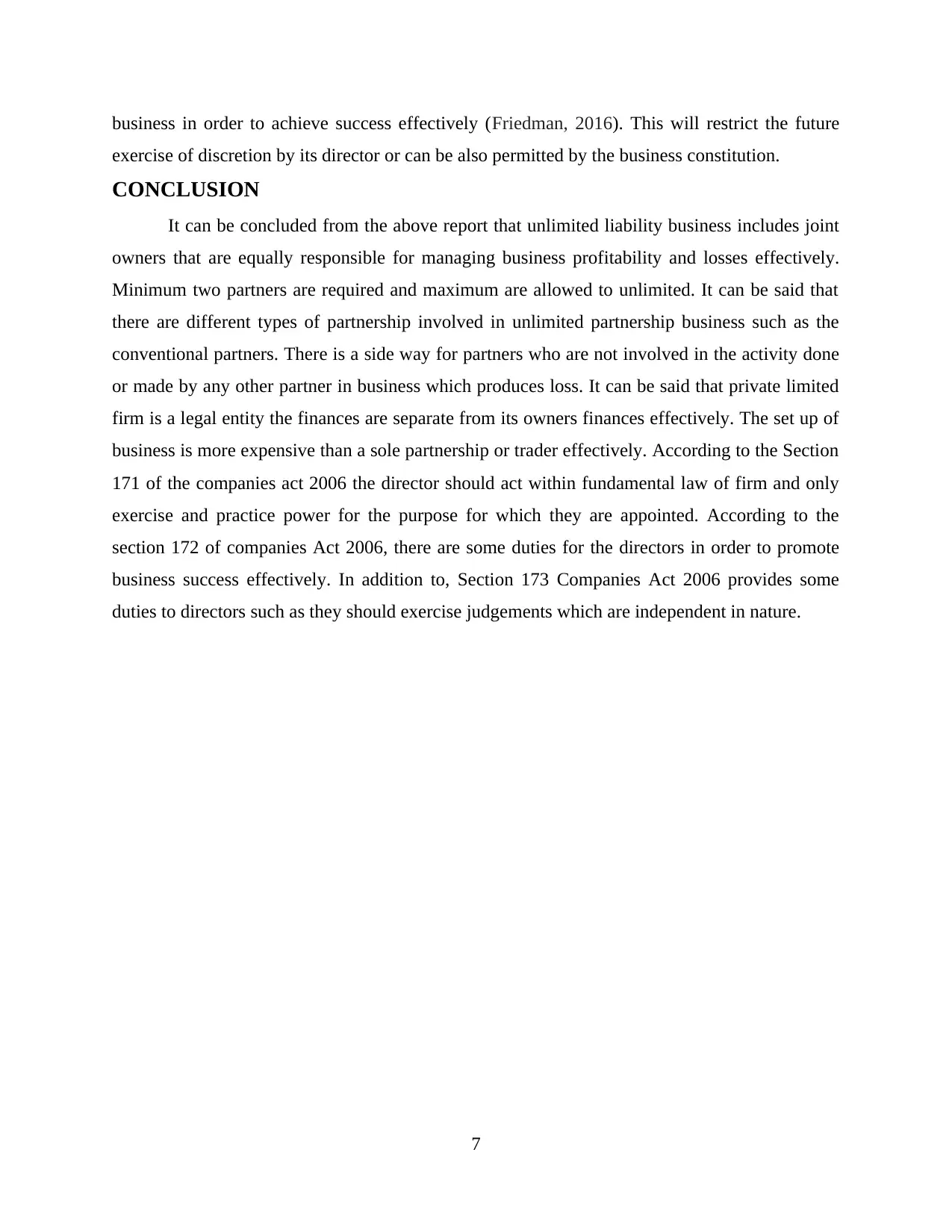
business in order to achieve success effectively (Friedman, 2016). This will restrict the future
exercise of discretion by its director or can be also permitted by the business constitution.
CONCLUSION
It can be concluded from the above report that unlimited liability business includes joint
owners that are equally responsible for managing business profitability and losses effectively.
Minimum two partners are required and maximum are allowed to unlimited. It can be said that
there are different types of partnership involved in unlimited partnership business such as the
conventional partners. There is a side way for partners who are not involved in the activity done
or made by any other partner in business which produces loss. It can be said that private limited
firm is a legal entity the finances are separate from its owners finances effectively. The set up of
business is more expensive than a sole partnership or trader effectively. According to the Section
171 of the companies act 2006 the director should act within fundamental law of firm and only
exercise and practice power for the purpose for which they are appointed. According to the
section 172 of companies Act 2006, there are some duties for the directors in order to promote
business success effectively. In addition to, Section 173 Companies Act 2006 provides some
duties to directors such as they should exercise judgements which are independent in nature.
7
exercise of discretion by its director or can be also permitted by the business constitution.
CONCLUSION
It can be concluded from the above report that unlimited liability business includes joint
owners that are equally responsible for managing business profitability and losses effectively.
Minimum two partners are required and maximum are allowed to unlimited. It can be said that
there are different types of partnership involved in unlimited partnership business such as the
conventional partners. There is a side way for partners who are not involved in the activity done
or made by any other partner in business which produces loss. It can be said that private limited
firm is a legal entity the finances are separate from its owners finances effectively. The set up of
business is more expensive than a sole partnership or trader effectively. According to the Section
171 of the companies act 2006 the director should act within fundamental law of firm and only
exercise and practice power for the purpose for which they are appointed. According to the
section 172 of companies Act 2006, there are some duties for the directors in order to promote
business success effectively. In addition to, Section 173 Companies Act 2006 provides some
duties to directors such as they should exercise judgements which are independent in nature.
7
⊘ This is a preview!⊘
Do you want full access?
Subscribe today to unlock all pages.

Trusted by 1+ million students worldwide
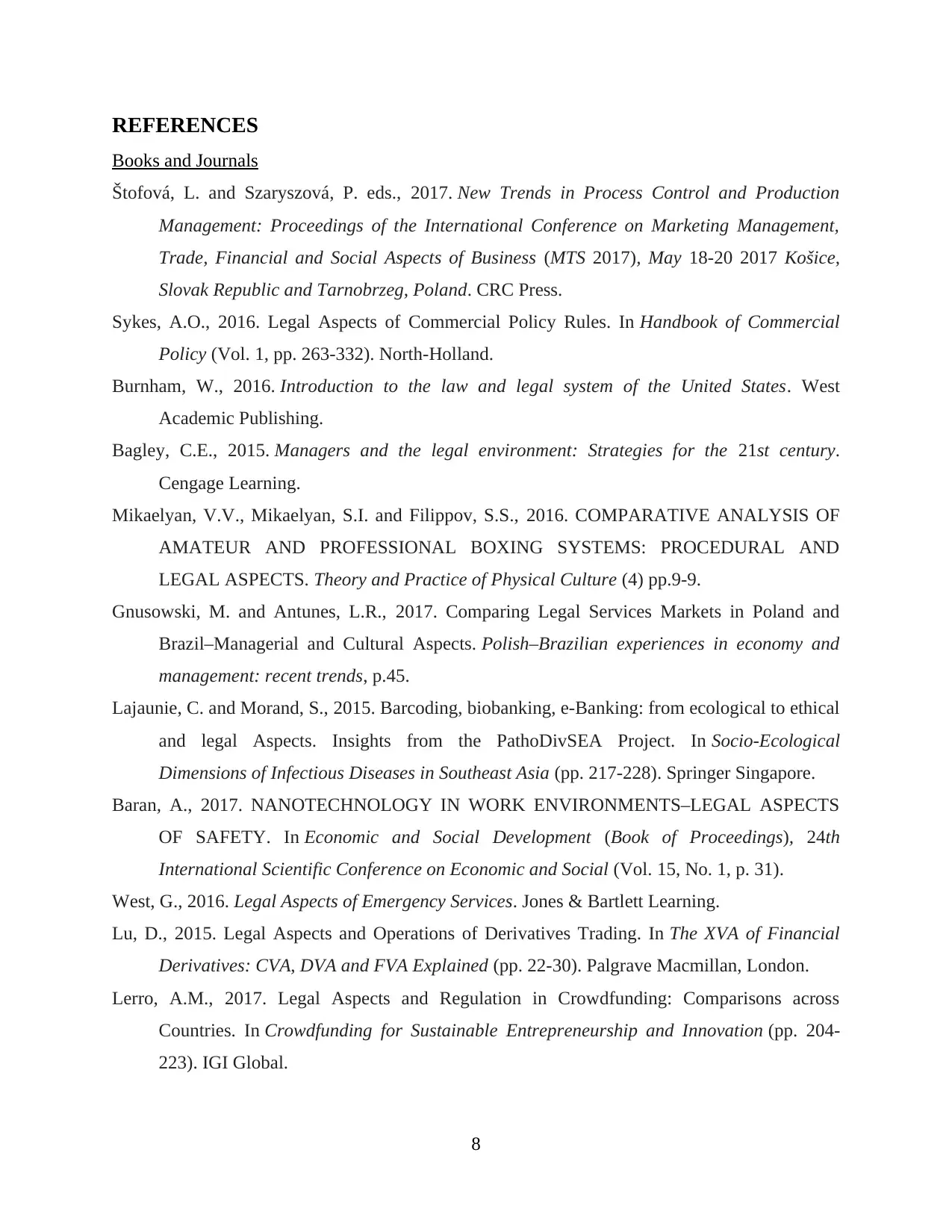
REFERENCES
Books and Journals
Štofová, L. and Szaryszová, P. eds., 2017. New Trends in Process Control and Production
Management: Proceedings of the International Conference on Marketing Management,
Trade, Financial and Social Aspects of Business (MTS 2017), May 18-20 2017 Košice,
Slovak Republic and Tarnobrzeg, Poland. CRC Press.
Sykes, A.O., 2016. Legal Aspects of Commercial Policy Rules. In Handbook of Commercial
Policy (Vol. 1, pp. 263-332). North-Holland.
Burnham, W., 2016. Introduction to the law and legal system of the United States. West
Academic Publishing.
Bagley, C.E., 2015. Managers and the legal environment: Strategies for the 21st century.
Cengage Learning.
Mikaelyan, V.V., Mikaelyan, S.I. and Filippov, S.S., 2016. COMPARATIVE ANALYSIS OF
AMATEUR AND PROFESSIONAL BOXING SYSTEMS: PROCEDURAL AND
LEGAL ASPECTS. Theory and Practice of Physical Culture (4) pp.9-9.
Gnusowski, M. and Antunes, L.R., 2017. Comparing Legal Services Markets in Poland and
Brazil–Managerial and Cultural Aspects. Polish–Brazilian experiences in economy and
management: recent trends, p.45.
Lajaunie, C. and Morand, S., 2015. Barcoding, biobanking, e-Banking: from ecological to ethical
and legal Aspects. Insights from the PathoDivSEA Project. In Socio-Ecological
Dimensions of Infectious Diseases in Southeast Asia (pp. 217-228). Springer Singapore.
Baran, A., 2017. NANOTECHNOLOGY IN WORK ENVIRONMENTS–LEGAL ASPECTS
OF SAFETY. In Economic and Social Development (Book of Proceedings), 24th
International Scientific Conference on Economic and Social (Vol. 15, No. 1, p. 31).
West, G., 2016. Legal Aspects of Emergency Services. Jones & Bartlett Learning.
Lu, D., 2015. Legal Aspects and Operations of Derivatives Trading. In The XVA of Financial
Derivatives: CVA, DVA and FVA Explained (pp. 22-30). Palgrave Macmillan, London.
Lerro, A.M., 2017. Legal Aspects and Regulation in Crowdfunding: Comparisons across
Countries. In Crowdfunding for Sustainable Entrepreneurship and Innovation (pp. 204-
223). IGI Global.
8
Books and Journals
Štofová, L. and Szaryszová, P. eds., 2017. New Trends in Process Control and Production
Management: Proceedings of the International Conference on Marketing Management,
Trade, Financial and Social Aspects of Business (MTS 2017), May 18-20 2017 Košice,
Slovak Republic and Tarnobrzeg, Poland. CRC Press.
Sykes, A.O., 2016. Legal Aspects of Commercial Policy Rules. In Handbook of Commercial
Policy (Vol. 1, pp. 263-332). North-Holland.
Burnham, W., 2016. Introduction to the law and legal system of the United States. West
Academic Publishing.
Bagley, C.E., 2015. Managers and the legal environment: Strategies for the 21st century.
Cengage Learning.
Mikaelyan, V.V., Mikaelyan, S.I. and Filippov, S.S., 2016. COMPARATIVE ANALYSIS OF
AMATEUR AND PROFESSIONAL BOXING SYSTEMS: PROCEDURAL AND
LEGAL ASPECTS. Theory and Practice of Physical Culture (4) pp.9-9.
Gnusowski, M. and Antunes, L.R., 2017. Comparing Legal Services Markets in Poland and
Brazil–Managerial and Cultural Aspects. Polish–Brazilian experiences in economy and
management: recent trends, p.45.
Lajaunie, C. and Morand, S., 2015. Barcoding, biobanking, e-Banking: from ecological to ethical
and legal Aspects. Insights from the PathoDivSEA Project. In Socio-Ecological
Dimensions of Infectious Diseases in Southeast Asia (pp. 217-228). Springer Singapore.
Baran, A., 2017. NANOTECHNOLOGY IN WORK ENVIRONMENTS–LEGAL ASPECTS
OF SAFETY. In Economic and Social Development (Book of Proceedings), 24th
International Scientific Conference on Economic and Social (Vol. 15, No. 1, p. 31).
West, G., 2016. Legal Aspects of Emergency Services. Jones & Bartlett Learning.
Lu, D., 2015. Legal Aspects and Operations of Derivatives Trading. In The XVA of Financial
Derivatives: CVA, DVA and FVA Explained (pp. 22-30). Palgrave Macmillan, London.
Lerro, A.M., 2017. Legal Aspects and Regulation in Crowdfunding: Comparisons across
Countries. In Crowdfunding for Sustainable Entrepreneurship and Innovation (pp. 204-
223). IGI Global.
8
Paraphrase This Document
Need a fresh take? Get an instant paraphrase of this document with our AI Paraphraser
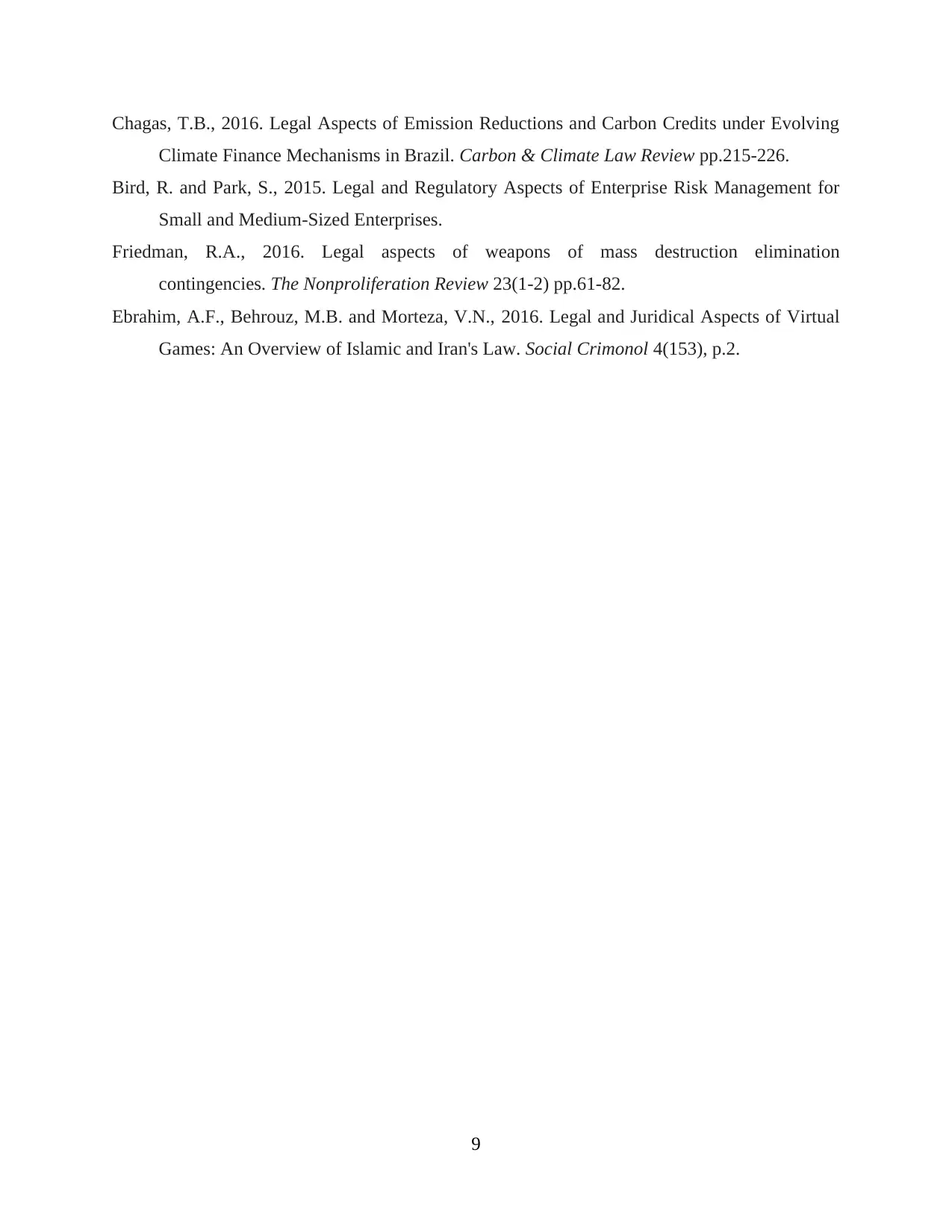
Chagas, T.B., 2016. Legal Aspects of Emission Reductions and Carbon Credits under Evolving
Climate Finance Mechanisms in Brazil. Carbon & Climate Law Review pp.215-226.
Bird, R. and Park, S., 2015. Legal and Regulatory Aspects of Enterprise Risk Management for
Small and Medium-Sized Enterprises.
Friedman, R.A., 2016. Legal aspects of weapons of mass destruction elimination
contingencies. The Nonproliferation Review 23(1-2) pp.61-82.
Ebrahim, A.F., Behrouz, M.B. and Morteza, V.N., 2016. Legal and Juridical Aspects of Virtual
Games: An Overview of Islamic and Iran's Law. Social Crimonol 4(153), p.2.
9
Climate Finance Mechanisms in Brazil. Carbon & Climate Law Review pp.215-226.
Bird, R. and Park, S., 2015. Legal and Regulatory Aspects of Enterprise Risk Management for
Small and Medium-Sized Enterprises.
Friedman, R.A., 2016. Legal aspects of weapons of mass destruction elimination
contingencies. The Nonproliferation Review 23(1-2) pp.61-82.
Ebrahim, A.F., Behrouz, M.B. and Morteza, V.N., 2016. Legal and Juridical Aspects of Virtual
Games: An Overview of Islamic and Iran's Law. Social Crimonol 4(153), p.2.
9
1 out of 11
Related Documents
Your All-in-One AI-Powered Toolkit for Academic Success.
+13062052269
info@desklib.com
Available 24*7 on WhatsApp / Email
![[object Object]](/_next/static/media/star-bottom.7253800d.svg)
Unlock your academic potential
Copyright © 2020–2026 A2Z Services. All Rights Reserved. Developed and managed by ZUCOL.





